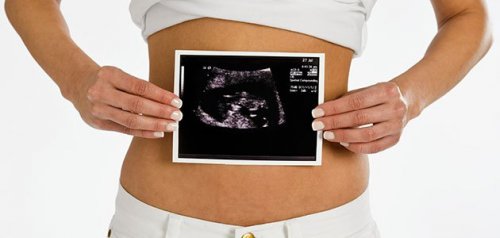Week 7 of Your Pregnancy

What happens for mother and baby during week 7 of pregnancy? You’ve already spent six weeks together, living the process of gestation and integration every day.
From week to week the baby is transforming as he or she develops. The mother’s body is also changing, as are the symptoms she experiences. Little by little, both are getting used to each other, and with each passing day the bond between them becomes stronger.
Week 7 of Pregnancy for the Mother
Although every woman experiences pregnancy differently, there are some features that are common to most pregnancies.
Although the mother’s body still hasn’t fully adjusted to its new state, it’s beginning to change to support the baby’s development. As the second month begins, morning sickness will continue if it has started already, or may appear for the first time.
Cravings will also continue, as well as repulsion by certain foods or smells.
Usually in the 7th week, the belly and breasts begin to look larger, the waist thickens, and the mother will need to urinate more frequently. Moods will vary, depending on each mother’s situation.
Generally, this is around when the pregnancy is confirmed, which leads to different reactions depending on whether the pregnancy was expected or wanted.

The Baby in Week 7 of Your Pregnancy
- This is a critical period for the fetus’ development. The various organs are forming. In fact, it is around week 7 when the embryo becomes a fetus.
- The baby’s actual age during week 7 of your pregnancy, counting from the last period, is five weeks from the moment of implantation. The baby is firmly implanted in the uterus and the mucus plug enlarges so that the cervix stays closed and separated from the outside world.
- The fetus is about one centimeter long and weighs less than a gram. The ultrasound will now show the beginnings of the arms, hands, and lower extremities.
- The heart beats regularly and the lungs also continue to develop. The brain can also be seen growing into two hemispheres.
- Some facial features can now be clearly seen, with the nose beginning to stand out. The eye and ear structures appear, and there may even be some light pigmentation in the irises.
- After the first few weeks, the tissue that will become the bones form. The digestive tract also forms, with a hollow area that will become the mouth.
Suggestions for Week 7 of Your Pregnancy
Nausea and vomiting, which are usually very unpleasant, can be relieved by eating small amounts of food five times a day. It’s important to drink enough water, avoiding carbonated drinks as much as possible.
Pay close attention to how your food is cooked. Pregnant women should consume well-cooked food, avoid unpasteurized cheeses, alcoholic drinks, and excessive caffeine.

It’s very important not to let this stage of pregnancy go by without seeing an obstetrician. Gaining weight, blood pressure, and balance in test results are all areas that need to be monitored.
Additionally, the mother will almost certainly feel tired and sleepy. Setting aside time to sit quietly, rest, and sleep will benefit both your own body and the baby’s development.
At week 7 of the pregnancy the embryo becomes a fetus
It’s also a good idea to avoid unstable forms of transportation that bounce around a lot or are very exposed. In general, doctors advise avoiding motorcycles and bicycles.
During this week of pregnancy, the embryo is connecting to the uterus, so there is still some risk of miscarriage.
It’s important not to neglect your skin. The stretching caused by the growth of a mother’s abdomen can lead to stretch marks once the child is born.
In the 7th week, a pregnant woman should take care of her skin with the appropriate lotions to keep her skin from losing its natural elasticity.
With regard to work, a woman in week 7 of her pregnancy who is not experiencing any problems can continue to lead a normal life. If you suspect that your work conditions may harm you or your baby, consult your doctor immediately.
What happens for mother and baby during week 7 of pregnancy? You’ve already spent six weeks together, living the process of gestation and integration every day.
From week to week the baby is transforming as he or she develops. The mother’s body is also changing, as are the symptoms she experiences. Little by little, both are getting used to each other, and with each passing day the bond between them becomes stronger.
Week 7 of Pregnancy for the Mother
Although every woman experiences pregnancy differently, there are some features that are common to most pregnancies.
Although the mother’s body still hasn’t fully adjusted to its new state, it’s beginning to change to support the baby’s development. As the second month begins, morning sickness will continue if it has started already, or may appear for the first time.
Cravings will also continue, as well as repulsion by certain foods or smells.
Usually in the 7th week, the belly and breasts begin to look larger, the waist thickens, and the mother will need to urinate more frequently. Moods will vary, depending on each mother’s situation.
Generally, this is around when the pregnancy is confirmed, which leads to different reactions depending on whether the pregnancy was expected or wanted.

The Baby in Week 7 of Your Pregnancy
- This is a critical period for the fetus’ development. The various organs are forming. In fact, it is around week 7 when the embryo becomes a fetus.
- The baby’s actual age during week 7 of your pregnancy, counting from the last period, is five weeks from the moment of implantation. The baby is firmly implanted in the uterus and the mucus plug enlarges so that the cervix stays closed and separated from the outside world.
- The fetus is about one centimeter long and weighs less than a gram. The ultrasound will now show the beginnings of the arms, hands, and lower extremities.
- The heart beats regularly and the lungs also continue to develop. The brain can also be seen growing into two hemispheres.
- Some facial features can now be clearly seen, with the nose beginning to stand out. The eye and ear structures appear, and there may even be some light pigmentation in the irises.
- After the first few weeks, the tissue that will become the bones form. The digestive tract also forms, with a hollow area that will become the mouth.
Suggestions for Week 7 of Your Pregnancy
Nausea and vomiting, which are usually very unpleasant, can be relieved by eating small amounts of food five times a day. It’s important to drink enough water, avoiding carbonated drinks as much as possible.
Pay close attention to how your food is cooked. Pregnant women should consume well-cooked food, avoid unpasteurized cheeses, alcoholic drinks, and excessive caffeine.

It’s very important not to let this stage of pregnancy go by without seeing an obstetrician. Gaining weight, blood pressure, and balance in test results are all areas that need to be monitored.
Additionally, the mother will almost certainly feel tired and sleepy. Setting aside time to sit quietly, rest, and sleep will benefit both your own body and the baby’s development.
At week 7 of the pregnancy the embryo becomes a fetus
It’s also a good idea to avoid unstable forms of transportation that bounce around a lot or are very exposed. In general, doctors advise avoiding motorcycles and bicycles.
During this week of pregnancy, the embryo is connecting to the uterus, so there is still some risk of miscarriage.
It’s important not to neglect your skin. The stretching caused by the growth of a mother’s abdomen can lead to stretch marks once the child is born.
In the 7th week, a pregnant woman should take care of her skin with the appropriate lotions to keep her skin from losing its natural elasticity.
With regard to work, a woman in week 7 of her pregnancy who is not experiencing any problems can continue to lead a normal life. If you suspect that your work conditions may harm you or your baby, consult your doctor immediately.
All cited sources were thoroughly reviewed by our team to ensure their quality, reliability, currency, and validity. The bibliography of this article was considered reliable and of academic or scientific accuracy.
- Betz, D., & Fane, K. (2020). Human Chorionic Gonadotropin. In StatPearls. StatPearls Publishing.
- Mateos, Luz María Fernández, and Antonio Sánchez Cabaco. “Embarazo: influencia de factores personales.” Familia: Revista de ciencias y orientación familiar 31 (2005): 51-72.
This text is provided for informational purposes only and does not replace consultation with a professional. If in doubt, consult your specialist.








